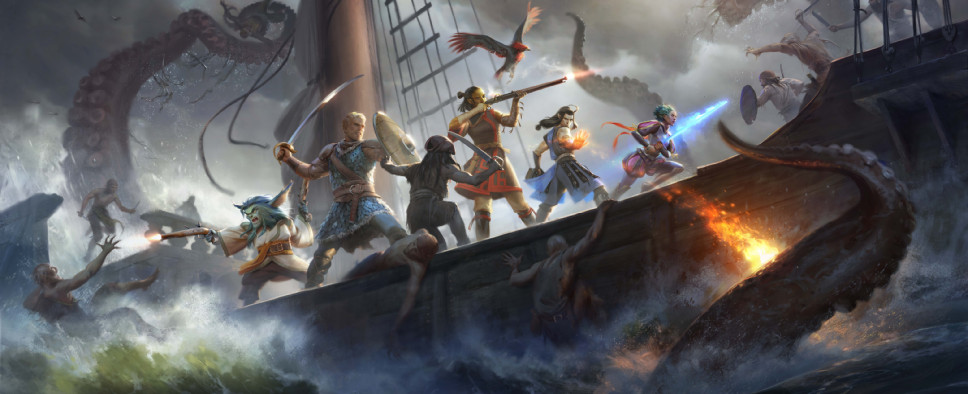Pillars of Eternity II: Deadfire Review
-
Category: ReviewsHits: 15316

Article Index
If you've read many of my reviews, then you might know that side quest campaigns are my least favorite, and Deadfire doesn't do anything to change that. The quests are competently written and constructed, as you'd expect from an Obsidian game, but most of them aren't memorable. They're just sort of there, and too many of them (particularly the bounties) don't include much in the way of background information or world building, as if Obsidian had to skimp in a few places to get the game out. In fact, while the world building was great in the first game, it's only a throw-in here. The inhabitants of the archipelago just refer to the gods by different names, making it sort of confusing who they're talking about, and for some of the factions, it's tough to remember which one is which. I mean, the only difference between the Vailian Trading Company and the Royal Deadfire Company is that they always want you to solve quests in opposing ways, which hardly makes them compelling.
The minimalist writing also infuses your companions. They interject comments during your conversations, they have distinctive attitudes and motivations, and their worldview causes them to like or dislike the things you do, which can lead to them leaving your party or perhaps becoming a romance option. Unfortunately, the one romance I tried was pathetic. There was zero shared chemistry between me and the companion, and I spent most of my "dating" time trying to find food for her pet bird, which didn't add anything to anything. The writing in Deadfire is definitely a step down from the first game, and I sort of worry that Obsidian focusing so much on spiffy 3D graphics and voiced dialogue meant that they didn't have as much time or money available for the most important part of the game.
Some games can get away with lackluster writing if the combat is fun and exciting, but I didn't enjoy that part of Deadfire, either. Obsidian is good at removing trash fights, so all of the encounters are different and meaningful, but the combat was just so easy that it was a bore. I played Deadfire using the "classic" difficulty, which is the middle option, but the further I got into the game, the easier the fights became -- and they got pretty easy by the time I reached level 10 (which is maybe a quarter of the way in). I just rolled right over a couple of dragons and a kraken, without needing to micromanage my party or quaff any potions, and that definitely wasn't the case in the first game, so I don't know if Obsidian screwed up the balance or changed their philosophy. About the only fights I had any trouble with were against "fampyrs" (aka vampires), because they could charm my OP characters and force them to fight amongst themselves. Eventually, I started a game on the "veteran" difficulty (one notch higher than "classic"), but I couldn't muster enough enthusiasm to reach any of the boss fights to see if it makes a difference. So perhaps it's the solution, or perhaps it isn't.
Even the ship battles are sort of odd. In order to shoehorn ship-to-ship combat into the game, Obsidian had to make them text-based and turn-based, where on each turn you might change direction or close the distance to your opponent or shoot your cannons. The problem is, you get the best rewards for capturing an opposing ship rather than sinking it, so there's no incentive whatsoever to damage the opposing ship, and one of the options at the start of each encounter is simply to close in for hand-to-hand combat (which is handled like every other fight, just on board a ship), so you can avoid the text-based part of the battles completely. I ended up firing my cannons exactly one time in the game, and that was only because I was attacked by a giant shark-like creature.
Conclusion
Obviously, I wasn't thrilled with Pillars of Eternity II: Deadfire, but there's good news for those of you who might be interested in the game. The engine is solid, the voice-acting is excellent, the quests make sense and give you lots of options for solving them -- and all of the things I didn't like about the game are subjective rather than objective. Going by the metacritic score for Deadfire, other reviewers certainly liked it more than I did. Plus, Obsidian has shown a willingness to keep working on their games, and to get them into good shape, so the content will likely improve over time.
But for me, I was on the fence with Deadfire. It's a competent game and provides 70 hours or content, but it didn't draw me in, and I was sort of happy when I finished it so I could move on to something else. Ultimately, Deadfire made me think of Storm of Zehir way more than I would have liked.


